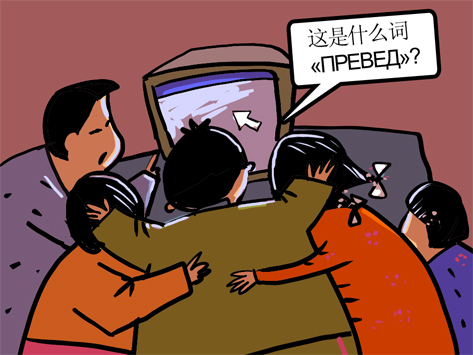Sinetologiya - notes about the Chinese Internet

Hello dear 哈博 儿 ! Since 1999 I have been living in China, and somewhere in 2007 I have been more or less actively working with the Chinese Internet (and this is not only your favorite Taobao , believe me).
Everyone has heard about Internet censorship in China , ruthless competition, supersonic technology copying, but in practice, few Russian companies have come across this. One has only to listen to podcasts and interviews on Echo of Moscow or Finam FM, in which top managers of large Russian Internet companies comment on some events from the Chinese Internet and at the same time give out so many “lulz” and factoids that it’s time for me to collect them for quotes and narration in the program “These Russians” on CCTV .
However, I could not endure this anymore and decided to publish my notes on the Chinese Internet under the name " Sinetologiya ". Two articles have already been published, I started with basic questions, but I'm going to dig deeper in the future (features of Chinese web design, Internet business and e-commerce in China, etc.). In general, welcome, or 欢迎 光临 !
Small excerpt
Choosing a memorable domain for the Chinese.
For starters, the simple truth is that the Chinese know and remember the Latin alphabet very poorly. In general, in China, the situation with foreign languages is not better than ours. We are saved only by the fact that the Cyrillic alphabet has relatively more in common with the Latin alphabet than the Chinese characters. Add to this that on average Russians can somehow read the Latin alphabet and put “a be tse de” into consonant syllables. The Chinese, however, the Latin seems completely alien and unreadable. This means that for the Chinese, remembering some Latin domain may be a little easier than remembering a few unfamiliar characters.
Therefore, it is not surprising that in China, domains consisting in whole or in part of numbers are so popular, because numbers are convenient to dictate and remember.
Another confirmation of this simple truth is advertising, in which often the advertiser’s site is not indicated at all, and something like “search in the search engine ...” is displayed / said and then the name or slogan of the advertiser.
Lyrical digression A
funny incident was in my practice when a certain company spent quite a bit of money to hang all of Beijing's taxis with its advertising. In advertising, the site address, a vivid slogan and a list of services were indicated large. But a competitor of this company made a fuss, did search engine optimization on his website and bought advertising in Baidu2 using the slogan of the first company, thus stealing most of their customers. After all, when a passenger got into a taxi, became interested in advertising, he remembered a vivid slogan, not an obscure website address, and only then looked for more information on a smartphone or computer through Baida, where the first five results belonged to the competitors of our unlucky company.
囧
Foreshadowing some questions, I’ll say: format (paragraphs) and name - a small tribute to Tema Lebedev and Maxim Spiridonov, whose “Covodstvo” / “Runetologii” I have been reading and listening to for a long time.
Thanks for the illustration to Alexei Iorsch!
